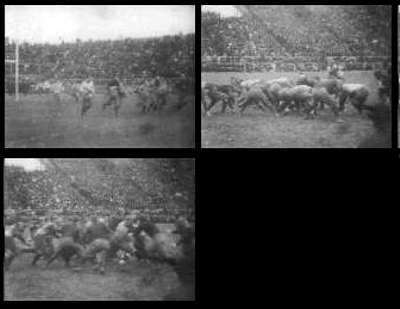 |
The birth date of football in the United States
is generally regarded by football historians as November 6, 1869, when
teams from Rutgers and Princeton Universities met for the first intercollegiate
football game. In those early games, there were 20 players to a team
and football still more closely resembled rugby than modern football.
The game of football has a history of constant rule changes. Rule changes have been implemented to bolster the excitement of the game of football and to increase the game's safety. In 1873, representatives from Columbia, Rutgers, Princeton, and Yale Universities met in New York City to formulate the first intercollegiate football rules for the increasingly popular game. These four teams established the Intercollegiate Football Association (IFA) and set 15 as the number of players allowed on each team. Walter Camp, the coach at Yale and a dissenter from the IFA over his desire for an eleven man team, helped begin the final step in the evolution from rugby-style play to the modern game of American football. The IFA’s rules committee, led by Camp, soon cut the number of players from fifteen to eleven, and also instituted the size of the playing field, at one hundred ten yards. In 1882 Camp also introduced the system of downs. After first allowing three attempts to advance the ball five yards, in 1906 the distance was changed to ten yards. The fourth down was added in 1912. Within a decade, concern over the increasing brutality of the game led to its ban by some colleges. Nearly 180 players had suffered serious injuries, and eighteen deaths had been reported from the brutal mass plays that had become common practice. So in 1905, President Theodore Roosevelt called upon Harvard, Princeton, and Yale to help save the sport from demise. |
|
|
|
| Next Page |